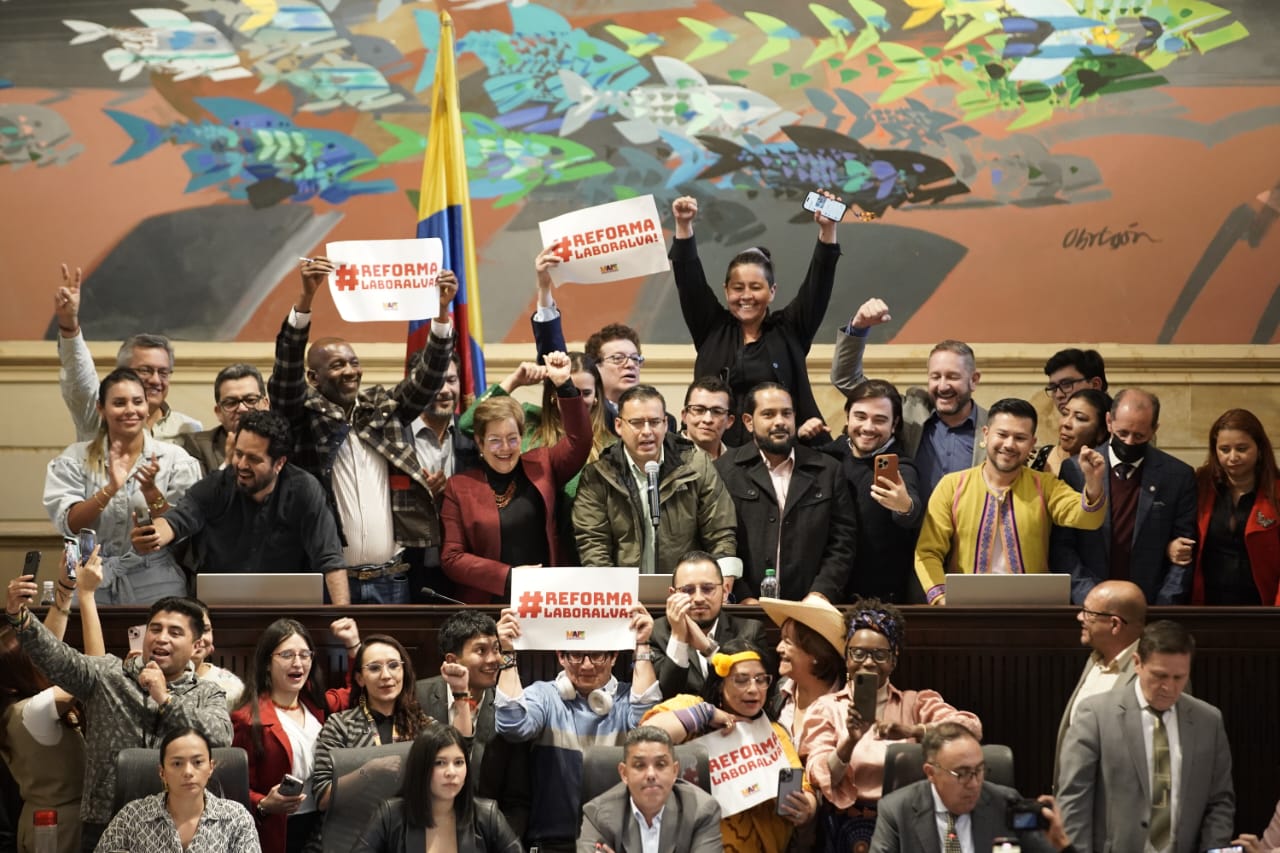The changes that the labor reform that is preparing for its third debate in Congress would bring

The labor reform of the Government of Gustavo Petro has two debates left in Congress to become law: the first is expected to begin next week in the Commission VII of the Senate and the last 'round' would have to pass before June 20 in the plenary session. Otherwise, the Executive could sink this reform that, after the departure of the Minister of Labor Gloria Inés Ramírez, will be led by her replacement Antonio Sanguino.
"We are going to move forward in an agreement that will bring the country in line with international democratic norms and standards," said the newly appointed minister.

Antonio Sanguino, new Minister of Labor. Photo: Presidency
The positive motion of 83 articles is signed by Senators Ferney Silva, Martha Peralta and Wilson Arias, from the Historic Pact, as well as Omar de Jesús Restrepo, from Comunes.
"We are holding public hearings in different cities to socialize the bill and we hope to begin to debate it on Tuesday of next week. Although there is no majority, the atmosphere is positive ," said Silva, who assured that the Government bench will meet today with Sanguino to be aligned for the discussion.
However, the filing of a negative report on the project is also pending. Among the congressmen of the Senate's Commission VII who are most reluctant to the project are Alirio Barrera and Honorio Henríquez.
What are the changes in the labor reform? The latest proposal maintains two of the initial key articles: one that brings forward the night shift from 9 to 7 p.m., meaning that working after that time would incur a 25 percent surcharge, and one that raises the surcharge for the mandatory day of rest or holiday from 75 to 100 percent.
Its implementation would be gradual as follows: starting in July 2025, the surcharge would increase to 80 percent; in July 2026 it would rise to 90 percent; and in July 2027 it would reach 100 percent.
The bill also retains the articles stating that the apprenticeship contract is a fixed-term employment contract. Likewise, the apprentice will receive from the company a remuneration of 60 percent of the legal monthly minimum wage in force during the training period and a minimum wage during the practical period.

Forum on the approval of the labor reform in the House of Representatives. Photo: Sergio Acero Yate / El Tiempo
In addition, it establishes that companies obliged to comply with the apprenticeship quota will have to pay the Sena a monthly amount corresponding to 1.8 minimum wages for each apprentice they do not hire.
Likewise, it is established that paternity leave in Colombia must increase progressively until reaching four weeks in 2026, as follows: in 2025 it will rise to three weeks and in 2026 it will reach four weeks.
These are some of the points that employers view with disapproval because they would increase labor costs, especially for companies that work at night.
“ Increasing costs will lead to less hiring of personnel in the night shifts. In addition, this measure could lead to an increase in accidents in occupational hazards because there will be a smaller number of workers performing the same tasks and with high risk,” can be read in a document that the Trade Union Council, made up of the 32 most representative trade unions in the business sector, sent to Congress in September.
For Jaime Alberto Cabal, president of the Fenalco merchants' union, the "disproportionate" 9.53 percent increase in the minimum wage for 2025 is another reason to vote against the project.

The night shift will be moved from 9 to 7 p.m. Photo: iStock
“The costs for companies would be unsustainable. For example, the night surcharge starting at 7 pm would be 8.95 percent, the increase in remuneration on mandatory rest days implies an increase of 25 percent and more than 3.5 billion pesos a year will be charged to the private sector due to the laborization of the Sena apprenticeship contract. “With this increase and if the labor reform goes through, companies in Colombia will collapse,” he said.
Regarding Rappi-type platforms, the initiative indicates that relationships may be dependent and subordinate or independent and autonomous.
On the one hand, when the digital worker in delivery services has the status of dependent and subordinate, the company must make the corresponding payments to the comprehensive social security system in the proportions defined in the current regulations. Part-time contributions may be made.
On the other hand, if the workers are independent and self-employed, the company will pay 60 percent of the health and pension contributions, compared to 40 percent paid by the worker.
In response, José Daniel López, executive director of the app association Alianza In, said that this is a “very positive” regulation that was “agreed upon” by the government, Congress and the majority of delivery workers to protect them.
Although the articles proposing the creation of an agricultural contract were rejected in the last debate in the House of Representatives, something that was celebrated by associations such as the Colombian Farmers' Society (SAC) because it did not reflect "the reality of the countryside," the new text of the positive proposal includes two articles that speak of contracting in this sector.
According to representative Mafe Carrascal, the formalization of digital platform workers should not be based on creating a contract tailored to the companies , but on covering them under labor law, taking into account their particularities. "I have always defended this position and I will continue to do so," she stressed.
Carrascal also said that the reform should be clearer in stating that, to avoid illegal outsourcing, companies that provide outsourcing services must have a business organization specialized in the functions that the contracting companies seek to provide. "In terms of collective rights, I have never agreed with the suppression that the opposition managed to include in the Chamber," he said.

Previous debates on the labour reform. Photo: César Melgarejo. EL TIEMPO
In the previous debates on the reform, new licenses for workers were included. For example, employers must also grant paid leave to people who need to attend to their children's school obligations , deal with judicial or legal matters related to gender-based violence of which they are victims, or attend scheduled or urgent medical appointments.
This last point includes cases in which the working woman has incapacitating menstrual cycles, dysmenorrhea or abdominal tension due to menstruation, associated with already diagnosed endometriosis.
In addition, the report includes a new three-day paid leave for marriage.
eltiempo






